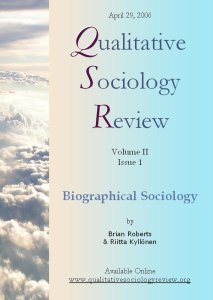Narrating the Digital Turn: data deluge, technomethodology, and other likely tales
DOI:
https://doi.org/10.18778/1733-8077.2.1.05Keywords:
digital technology, data deluge, narrative identity, psychobiography, storytellingAbstract
In this paper it is argued that digital technologies will have a transformative effect in the social sciences in general and in the fast developing field of narrative studies in particular. It is argued that the integrative and interdisciplinary nature of narrative approaches are further enhanced by the development of digital technologies and that the collection of digital data will also drive theoretical and methodological developments in narrative studies. Biographical Sociology will also need to take account of lives lived in, and transformed by, the digital domain. How these technologies may influence data collection methods, how they might influence thinking about what constitutes data, and what effects this might have on the remodeling of theoretical approaches are all pressing questions for the development of a Twenty First Century narratology. As Marshall McLuhan once put it “First we shape our tools and then our tools shape us”.
Downloads
References
Bamberg, Michael (2004) “Narrative Discourse and Identities.” Pp. 213 - 237 in Narratology beyond Literary Criticism, edited by J.C. Meister, T. Kindt, W. Schernus and M. Stein. Berlin and New York: Walter de Gruyter.
Google Scholar
Bauman, Zygmunt (2000) Liquid Modernity. Cambridge: Polity Press.
Google Scholar
Crabtree, Andy (2004) “Taking technomethodology seriously: hybrid change in the ethnomethodology – design relationship.” European Journal of Information Systems 13(3): 195 – 209.
Google Scholar
DOI: https://doi.org/10.1057/palgrave.ejis.3000500
Cantwell-Smith, Brian (1998) On the Origin of Objects. Cambridge, Massachusetts: Bradford Books, MIT Press.
Google Scholar
Danto, Arthur (1985) Narration and Knowledge. New York: Columbia University Press.
Google Scholar
Elkin, James (1996) The Object Stares Back. San Diego: Harvest.
Google Scholar
Freedman, Jill and Gene Combs (1996) Narrative Therapy. The Social Construction of Preferred Realities. New York: W. W. Norton and Co.
Google Scholar
Gatrell, Anthony (2003) Complexity theory and geographies of health: a modern and global synthesis? Paper for Complexity Group Lancaster University.
Google Scholar
Hirsch, Marianne (2002) Family Frames: photography narrative and postmemory. Cambridge, Massachusetts and London: Harvard University Press.
Google Scholar
Hurwitz, Brian, Trisha Greenhalgh and Vieda Skultans (2004) Narrative Research in Health and Illness. Oxford: Blackwell Publishing.
Google Scholar
DOI: https://doi.org/10.1002/9780470755167
JISC Briefing Paper (2004) “The Data Deluge: Preparing for the explosion in data.” Web page, November 15. Retrieved April 12, 2006 http://www.jisc.ac.uk/index.cfm?name=pub_datadeluge
Google Scholar
Jones, Kip (2005) “The Art of Collaborative Storytelling: arts-based representations of narrative contexts.” Draft for ISA Research Committee on Biography and Society RC38 Newsletter, summer 2005. Retrieved April 12, 2006 http://www.angelfire.com/zine/kipworld/cprp.index.html
Google Scholar
Mitleton-Kelly, Eve (2004) Complex Systems and Evolutionary Perspectives on Organisations: the application of complexity Theory to Organisations. Amsterdam: Pergammon.
Google Scholar
Prest, David (2006) “Why I Prefer Polished Podcasts.” Guardian Unlimited, February 27th, p. B1.
Google Scholar
Van den Haven, Elsie (2004) Graspable Cues for Everyday Recollecting. Eindhoven: Technische Universiteit Eindhoven.
Google Scholar
Downloads
Published
How to Cite
Issue
Section
License

This work is licensed under a Creative Commons Attribution-NonCommercial-NoDerivatives 4.0 International License.











